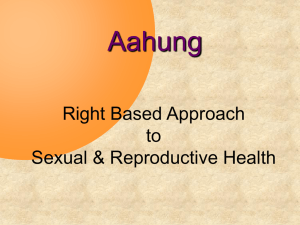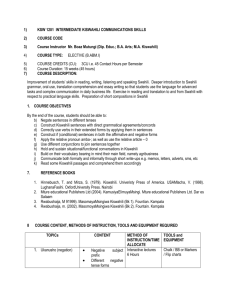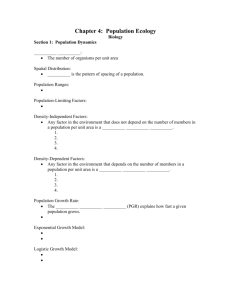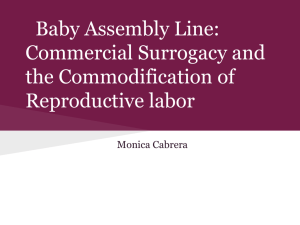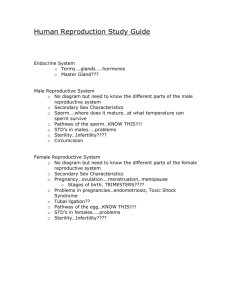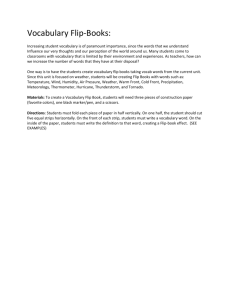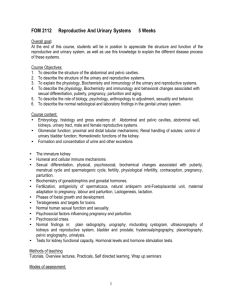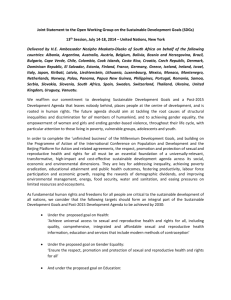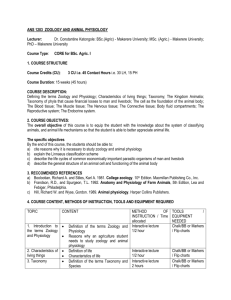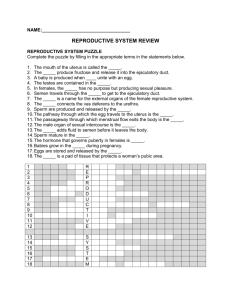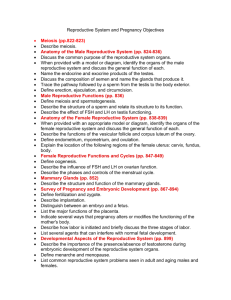ANS 4203 ANIMALPHYSIOLOGY AND BIOTECHNOLOGY
advertisement
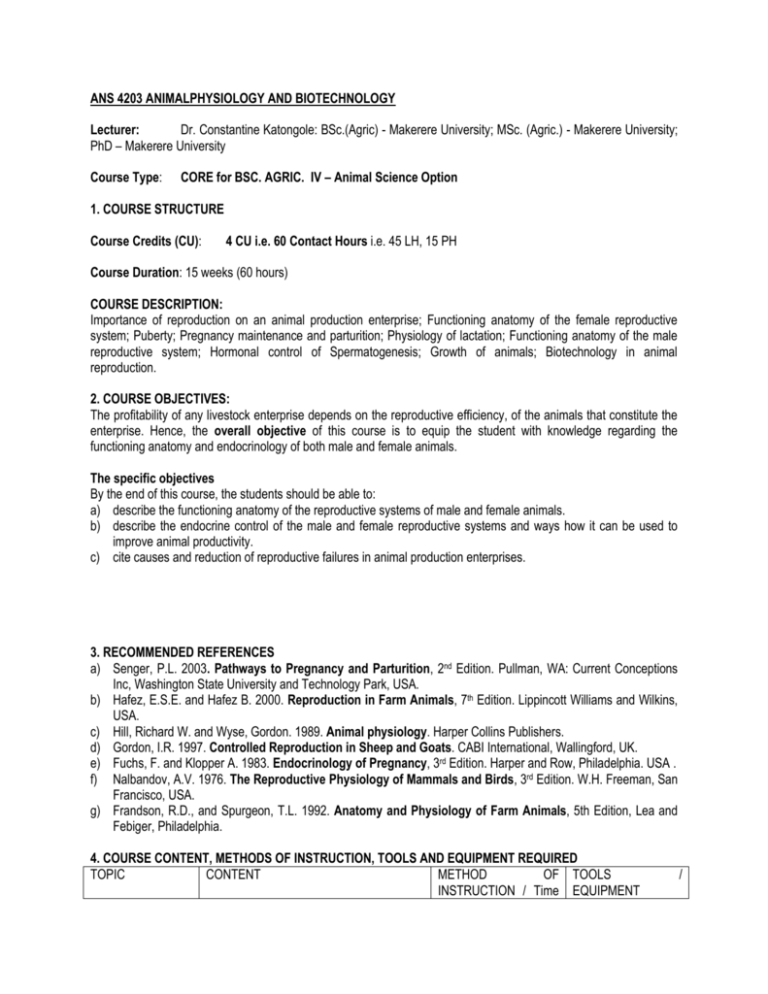
ANS 4203 ANIMALPHYSIOLOGY AND BIOTECHNOLOGY Lecturer: Dr. Constantine Katongole: BSc.(Agric) - Makerere University; MSc. (Agric.) - Makerere University; PhD – Makerere University Course Type: CORE for BSC. AGRIC. IV – Animal Science Option 1. COURSE STRUCTURE Course Credits (CU): 4 CU i.e. 60 Contact Hours i.e. 45 LH, 15 PH Course Duration: 15 weeks (60 hours) COURSE DESCRIPTION: Importance of reproduction on an animal production enterprise; Functioning anatomy of the female reproductive system; Puberty; Pregnancy maintenance and parturition; Physiology of lactation; Functioning anatomy of the male reproductive system; Hormonal control of Spermatogenesis; Growth of animals; Biotechnology in animal reproduction. 2. COURSE OBJECTIVES: The profitability of any livestock enterprise depends on the reproductive efficiency, of the animals that constitute the enterprise. Hence, the overall objective of this course is to equip the student with knowledge regarding the functioning anatomy and endocrinology of both male and female animals. The specific objectives By the end of this course, the students should be able to: a) describe the functioning anatomy of the reproductive systems of male and female animals. b) describe the endocrine control of the male and female reproductive systems and ways how it can be used to improve animal productivity. c) cite causes and reduction of reproductive failures in animal production enterprises. 3. RECOMMENDED REFERENCES a) Senger, P.L. 2003. Pathways to Pregnancy and Parturition, 2nd Edition. Pullman, WA: Current Conceptions Inc, Washington State University and Technology Park, USA. b) Hafez, E.S.E. and Hafez B. 2000. Reproduction in Farm Animals, 7th Edition. Lippincott Williams and Wilkins, USA. c) Hill, Richard W. and Wyse, Gordon. 1989. Animal physiology. Harper Collins Publishers. d) Gordon, I.R. 1997. Controlled Reproduction in Sheep and Goats. CABI International, Wallingford, UK. e) Fuchs, F. and Klopper A. 1983. Endocrinology of Pregnancy, 3rd Edition. Harper and Row, Philadelphia. USA . f) Nalbandov, A.V. 1976. The Reproductive Physiology of Mammals and Birds, 3rd Edition. W.H. Freeman, San Francisco, USA. g) Frandson, R.D., and Spurgeon, T.L. 1992. Anatomy and Physiology of Farm Animals, 5th Edition, Lea and Febiger, Philadelphia. 4. COURSE CONTENT, METHODS OF INSTRUCTION, TOOLS AND EQUIPMENT REQUIRED TOPIC CONTENT METHOD OF TOOLS INSTRUCTION / Time EQUIPMENT / 1. Importance of reproduction on an animal production enterprise 2. Functioning anatomy of a female reproductive system 3. Functioning anatomy of the male reproductive system 4. Puberty 5. Pregnancy, maintenance and parturition 6. Physiology of allocated Reproductive efficiency and factors Interactive lecture 2 hour affecting it Definition of Infertility and Sterility Why study reproduction? Interactive lecture The Ovary The secondary female reproductive 6 hours organs and their functions Laboratory work on female goat and pig reproductive system (Dissection - 6 hours) Interactive lecture The Testis 5 hours Endocrine function of the testis Exocrine function of the testis Laboratory work on Pituitary control of testicular function male goat and pig Testicular descent, cryptochidism reproductive system Spermatogenesis (Dissection 6 hours) The secondary male reproductive organs and their functions The accessory glands Erection and Ejaculation The role of LH, FSH, Testosterone in male physiology Interactive lecture Definition of puberty Onset and factors controlling the onset 5 hours of puberty Body changes associated with puberty The oestrus cycle vs. menstruation in humans Oestrus synchronisation Multiple ovulation Interactive lecture Process of fertilization 9 hours Phenomenon of polyspermy Implantation Placentation Pregnancy recognition Pregnancy maintenance – Progesterone production, Luteotrophic complex in rats, Rabbits, Sheep, Goats, Cow and Woman. Parturition Pregnancy termination Role of Releasing Factors, ACTH, Glucocorticoids, Estrogens, Oxytocin, Vasopressin, PGF2α and in foetal expulsion and placenta expulsion Retained placenta & treatment Interactive lecture Functioning anatomy of the udder NEEDED Chalk/BB or Markers / Flip charts Chalk/BB or Markers / Flip charts Chalk/BB or Markers / Flip charts Chalk/BB or Markers / Flip charts Chalk/BB or Markers / Flip charts Chalk/BB or Markers lactation 8. Hormonal control of Spermatogenesis 7. Endocrinology Glandular and duct system of the udder Milk synthesis and milk letdown Agalactia – causes and implications The milk curve and reasons for its shape Classification of glands Nervous vs Endocrine control Chemical nature of hormones Mechanisms of hormone action Hormone receptors Examples of endocrine glands Hypothalamus, Pituitary, Leydig cells, Sertoli cell interaction 4 hours / Flip charts Handouts cycles Interactive lecture 3 hours on life Chalk/BB or Markers / Flip charts Handouts on male hormone profile Interactive lecture 4 hours Chalk/BB or Markers / Flip charts Handouts on male hormone profile 9. Growth of animals 10. Biotechnology in animal production Definition of growth The growth curve Description of growth The process of growth Control of growth Factors that affect growth rate Growth promoting agents Porcine and bovine somatotrophin (PST and BST) Definition of Biotechnology Embryo transfer (Multiple ovulation and embryo transfer - MOET) In vitro fertilization Cloning/Splitting of embryos Oestrus synchronization Artificial insemination Use of Porcine and Bovine Somatotrophin (PST and BST) Growth stimulants Synthetic hormonal compounds DNA manipulation Vaccines 5. SUMMARY OF TIME NEEDED Interactive lectures covering theory 5 hours Interactive lecture 7 hours Field visit (on AI – 3 hours) Chalk/BB or Markers / Flip charts Laboratory-based practicals Field visits 2 hours 3 hours 60 hours 6. OVERALL COURSE EVALUATION Continuous Assessment Test Laboratory and Field visit Write-ups Final examination 30% 0% 60%
